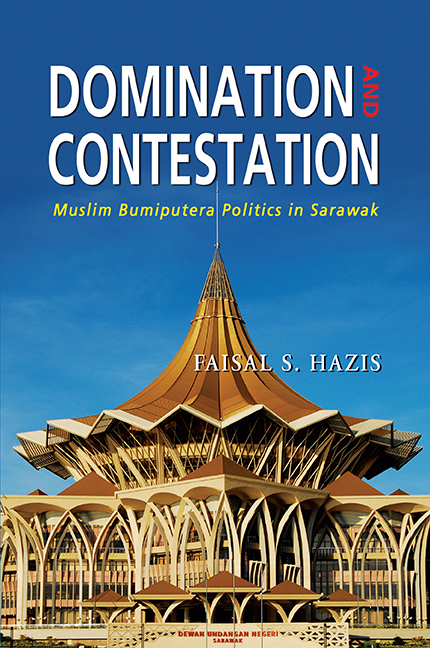Book contents
- Frontmatter
- Contents
- List of Tables
- List of Figures
- Preface
- List of Abbreviations
- 1 Introduction
- 2 State and Social Forces in Sarawak
- 3 The Resurgence of Muslim Bumiputera Politics, 1970–81
- 4 Years of Turbulence, 1981–87
- 5 Consolidation and Domination of the Muslim Bumiputera, 1987–2003
- 6 Muslim Bumiputera Politics in the Post-Mahathir Era, 2003–06
- 7 The Coastal Malays of Southwest Sarawak: A Case Study of the Muslim Bumiputera's Political Domination
- 8 Conclusion
- Postscript
- Appendices
- Bibliography
- Index
- About the Author
6 - Muslim Bumiputera Politics in the Post-Mahathir Era, 2003–06
Published online by Cambridge University Press: 21 October 2015
- Frontmatter
- Contents
- List of Tables
- List of Figures
- Preface
- List of Abbreviations
- 1 Introduction
- 2 State and Social Forces in Sarawak
- 3 The Resurgence of Muslim Bumiputera Politics, 1970–81
- 4 Years of Turbulence, 1981–87
- 5 Consolidation and Domination of the Muslim Bumiputera, 1987–2003
- 6 Muslim Bumiputera Politics in the Post-Mahathir Era, 2003–06
- 7 The Coastal Malays of Southwest Sarawak: A Case Study of the Muslim Bumiputera's Political Domination
- 8 Conclusion
- Postscript
- Appendices
- Bibliography
- Index
- About the Author
Summary
INTRODUCTION
Since 1970, the central state has relied on Muslim Melanau strongmenpoliticians to administer Sarawak albeit the changes in the central state leadership. When Rahman Yakub took over the helm from Tawi Sli in July 1970, the central state was still led by Tunku Abdul Rahman. However, Tunku had lost the legitimacy to rule following the racial riots of 13 May 1969, which triggered the formation of the National Operations Council headed by Deputy Prime Minister Abdul Razak. As the de facto central state leader, Razak was the prime figure in elevating Rahman as Sarawak's third Chief Minister after the 1970 negeri election. When Razak finally became the Prime Minister in September 1970, Rahman's position was firmly secured with the former lending his undivided support towards the strongman-politician. The sudden death of Razak in 1976 paved the way for Hussein Onn to assume the central state leadership which inevitably changed the political landscape in Sarawak. Unlike Razak, the new premier was not willing to accommodate Rahman who became increasingly powerful and sometimes critical of the central state. Without the strong support of the central state coupled with the instability within the Sarawak Barisan Nasional (SBN), Rahman finally stepped down as Sarawak's third Chief Minister; five years after Hussein Onn's appointment as the premier.
On March 1981, Abdul Taib Mahmud succeeded his uncle during which Hussein Onn was still holding the helm of the central state leadership. Although Taib was not the central state's preferred choice, his candidacy still received the central leaders’ support especially from Dr Mahathir Mohamad who was then the Deputy Prime Minister. Two months after Taib's appointment as Sarawak's Chief Minister, Dr Mahathir rose to become Malaysia's fourth Prime Minister. During Dr Mahathir's tenure, the central state forged a strong relationship with Taib, allowing the strongman-politician to become arguably the most powerful politician at the periphery of the state.
After dominating Malaysian politics for twenty-one years, Dr Mahathir unexpectedly announced his resignation during the UMNO general assembly in June 2002. The longest-serving premier, however, was coaxed by his party members to stay on, prompting Dr. Mahathir to delay his retirement until October 2003.
- Type
- Chapter
- Information
- Domination and ContestationMuslim Bumiputera Politics in Sarawak, pp. 206 - 227Publisher: ISEAS–Yusof Ishak InstitutePrint publication year: 2011

